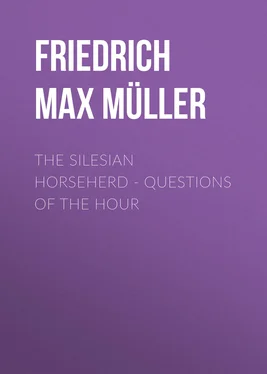Friedrich Max Müller - The Silesian Horseherd. Questions of the Hour
Здесь есть возможность читать онлайн «Friedrich Max Müller - The Silesian Horseherd. Questions of the Hour» — ознакомительный отрывок электронной книги совершенно бесплатно, а после прочтения отрывка купить полную версию. В некоторых случаях можно слушать аудио, скачать через торрент в формате fb2 и присутствует краткое содержание. Жанр: foreign_prose, foreign_religion, Философия, foreign_psychology, foreign_antique, на английском языке. Описание произведения, (предисловие) а так же отзывы посетителей доступны на портале библиотеки ЛибКат.
- Название:The Silesian Horseherd. Questions of the Hour
- Автор:
- Жанр:
- Год:неизвестен
- ISBN:нет данных
- Рейтинг книги:4 / 5. Голосов: 1
-
Избранное:Добавить в избранное
- Отзывы:
-
Ваша оценка:
- 80
- 1
- 2
- 3
- 4
- 5
The Silesian Horseherd. Questions of the Hour: краткое содержание, описание и аннотация
Предлагаем к чтению аннотацию, описание, краткое содержание или предисловие (зависит от того, что написал сам автор книги «The Silesian Horseherd. Questions of the Hour»). Если вы не нашли необходимую информацию о книге — напишите в комментариях, мы постараемся отыскать её.
The Silesian Horseherd. Questions of the Hour — читать онлайн ознакомительный отрывок
Ниже представлен текст книги, разбитый по страницам. Система сохранения места последней прочитанной страницы, позволяет с удобством читать онлайн бесплатно книгу «The Silesian Horseherd. Questions of the Hour», без необходимости каждый раз заново искать на чём Вы остановились. Поставьте закладку, и сможете в любой момент перейти на страницу, на которой закончили чтение.
Интервал:
Закладка:
And in this lies the great interest of the lost treatise of Celsus. Had he been an Epicurean, as Origen supposed, he would have had no personal interest in the Logos. But this Logos had become at that time to such an extent the common property of Greek philosophy, that the Jew, under whose mask Celsus at the outset attacked the Christians, could quite naturally express his willingness to acknowledge the Logos as the Son of God. Origen, it is true, says that the Jew has here forgotten his part, for he had himself known many Jewish scholars, no one of whom would have acknowledged such an idea. This shows that Origen did not know the works of Philo, who would certainly have offered no objection to such a doctrine, for he himself calls the Logos the first-born Son (υἱὸς πρωτόονος) 29 29 M. M., Theosophy , p. 404.
When therefore Celsus, the heathen philosopher, admits through the mouth of the Jew that the Logos is the Son of God, he is merely on his guard against the identification of any individual with the Son of God and indirectly with the Logos, that is to say, he does not wish to be a Christian. At all events we see how general was the view at that time, that the whole creation was the realisation of the Logos, nay, of the Son of God; that God uttered Himself, revealed Himself, in the world; that each natural species is a Word, a Thought of God, and that finally the idea of the entire world is born of God, and is thereby the Son of God.
This idea of a Son of God, although in its philosophical sense decidedly Greek, had, it is true, certain preparatory parallels among the Jews, on which Christian theologians have laid only too great stress. In the fifth book of Moses we read, “You are children of the Lord your God.” In the book of Enoch, chap. cv., the Messiah is also called the Son of God, and when the tempter says to Christ, Matthew iv. 1, “If thou be the Son of God,” it means the same as “If thou be the Messiah.”
The question is: Is this Jewish conception of the Son of God as Messiah the Christian as well? Such it has been, at least in one book of the Christian church, in the Fourth Gospel, and it found its expression first in the representation that Joseph was descended from David; secondly, in the belief that Jesus had no earthly father. We see here at once the first clear contradiction between Christian philosophy and Christian mythology. If Joseph were not the father of Jesus, how could Joseph's descent from David prove the royal ancestry of Jesus? And how does it follow from his being the Son of God that he had no earthly father? Although he was the Son of God, he was called the son of the carpenter, and his brothers and sisters were well known. The divine birth demands the human; without it, it is entirely unintelligible. We know from the recently discovered ancient Syrian translation of the Gospels that the two streams of thought—that Christ was the Son of God, and that at the same time he had an earthly father,—could flow side by side, quite undisturbed, without the one rendering the other turbid.
It was the misunderstanding of the spiritual birth of Christ from his divine Father, and even from his divine mother (the Ruach, feminine, the holy spirit), that appeared to make it necessary to deny him an earthly father, and to assert that even his human mother did not conceive and give birth to him in the ordinary way. In the earliest period of the Christian church this was otherwise. It was considered at that time that in Christ the divine sonship went hand in hand with the human, and further that the one without the other would lose its true meaning. In a Syrian palimpsest, which was recently discovered in the convent at Mount Sinai by Mrs. Smith Lewis, and which, being written in the fifth century, presupposes a still older Syrian translator, we now see an original Greek text, probably of the second century, in which the Davidic genealogy of Joseph (Matthew i. 16) is really the genealogy of Jesus, for it is there said, “Jacob begat Joseph; Joseph to whom the virgin Mary was espoused begat Jesus, who is called Christ.” In the twenty-first verse it reads also, “And she shall bear him a son,” and in the twenty-fifth verse, “And took unto him his wife, and she bare him a son, and he called his name Jesus.” This purely human birth of Jesus does not in any manner disturb the belief in his true divine origin, as the Son of God, as the first-born, the image of God, whose name was called the Word of God, i.e. Logos. On the contrary, it removes all difficulties with which so many Christians have contended, openly or in silence, when they asked themselves how it is possible to conceive a human birth, a human mother, without a human father. Even a deification of the mother, or even of the grandmother, such as is proclaimed by the Roman church, does not help any honest soul out of this mire which has been made by well-meaning but ignorant theologians. The old Christian philosophers, the old church fathers, saints, and martyrs, alone give us light and leading. As long as we conceive the divine sonship of Christ from the Jewish or Greek mythological standpoint, the true divine nature of Christ remains a mere phrase. When, however, we call to our aid the most orthodox and enlightened men of the second century, we find that such men as Justin, Tatian, Theophilus, Athenagoras, Apollonius 30 30 See the Deutsche Rundschau , 1895, XXXIII, p. 47.
and Clement, to say nothing of Origen, believed in Jesus as the only begotten son of God 31 31 μονογενής υἱὸς τοῦ θεοῦ.
in the sense which these words had at that time for every one who spoke and thought in Greek. This Son is often represented as distinguishable from the Father, but not as separable. Of a Son of God in the Jewish sense of the word, of a descendant of David, the evangelist would never have said that all things were made by him. That could be affirmed only of the true Son of God, of the Logos, as the thought of God, which is uttered in the visible world.
In what sense this Logos was recognised in Jesus, is certainly a difficult question, and here the work of Celsus would have been of great use to us, for he expressly states that he has no objection to the Logos idea; but how philosophers could accept an incarnation 32 32 Ὁ λόγος σὰρξ ἐγέιετο.
of this Logos in Jesus, was beyond his understanding. It must be borne in mind that matter and flesh were held by Celsus to be something so unclean, that according to him the Deity could only operate on matter by means of an endless number of intermediaries (a true fœtus œonum ). This obscurity in the conception of Jesus as Logos by the Christian church is the reason why Celsus does not regard Joseph as the natural father of Jesus, but Panthera. Origen, of course, denounces this very indignantly; and the legend is nothing more than one of the many calumnies, which are nearly always to be traced among the opponents of a new religion and its founders. For the true nature and the divine birth of Christ, as Origen himself seems to feel, such a story would naturally have no significance whatever. It remains true, however, that no writer of authority of the second and third centuries has clearly explained in what sense the Christian church conceived Jesus as the Logos.
Three conceptions are possible. The first appears to have been that of the Fourth Gospel, that the Logos, in all its fulness, as the Son, who in the beginning was with God and was God, by whom all things were made, became flesh in Jesus, and that this Jesus gave to those who believed in him as Logos the power themselves to become sons of God, born like him not of blood nor of the will of flesh, but of God. This may also explain why the legendary details of the birth of Christ are never mentioned in the Fourth Gospel. But however clear the view of the evangelist is, it nevertheless remains obscure how he conceived the process of this incarnation of an eternal being, transcending time and space and comprehending the whole world, which lived among them, which, as is said in the Epistle of John, was from the beginning, that which we have heard, that which we have seen with our eyes, that which we have beheld and our hands handled, the Word of life, 33 33 λόγος τῆς ζοῆς.
etc. If we think ourselves for a moment into this view, into the unity of the Divine that lives and moves in the Father, in the Logos, and in all souls that have recognised the Logos, we shall comprehend the meaning of the statement, that whoever believes in Jesus is born of God, that whoever has the Son, has the life. To have the truth, to have eternal life, to have the Son, to have the Father, all this then signifies one and the same thing for the evangelist, and for the greatest among the ante-Nicene fathers.
Интервал:
Закладка:
Похожие книги на «The Silesian Horseherd. Questions of the Hour»
Представляем Вашему вниманию похожие книги на «The Silesian Horseherd. Questions of the Hour» списком для выбора. Мы отобрали схожую по названию и смыслу литературу в надежде предоставить читателям больше вариантов отыскать новые, интересные, ещё непрочитанные произведения.
Обсуждение, отзывы о книге «The Silesian Horseherd. Questions of the Hour» и просто собственные мнения читателей. Оставьте ваши комментарии, напишите, что Вы думаете о произведении, его смысле или главных героях. Укажите что конкретно понравилось, а что нет, и почему Вы так считаете.












